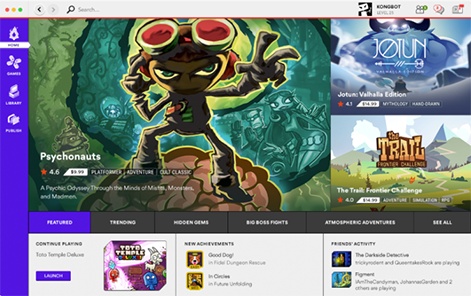Earlier this week, Kongregate revealed that it was launching its own PC games client Kartridge. We caught up with the firm's chief Emily Greer to find out a bit more about this new platform.
What's the thinking behind Kartridge?
In my mind, Kartridge is the next evolution of Kongregate. It's focused on bringing the things we care about deeply, supporting game developers and building thriving game communities, to a new audience and broaden the types of games and developers we support even further.
Kartridge is more than just a place to discover games. Our goal is to make a platform that's inviting to everyone, that shows players the games they want to play, when they want to play them, and gives developers the tools to make their games successful. We’re creating a community that brings together players who are looking for a better, more engaging place to discover new games.
What kind of developers are you hoping to attract to this platform?
Kartridge is open to all games and developers. We're currently focusing our outreach efforts on independent developers, but as the platform grows we hope to see a wide variety of game genres being represented as well as developers of all sizes.
What’s your pitch to developers to get involved?
Our pitch is that we are really focused on their needs, across a wide range of issues. We’re making upload easy with easily customised store pages that really highlight the art and gameplay of the game, to supporting a wide array of business models for games, because that’s not one-size-fits-all. We’re focused on building a healthy community -- we hear from a lot of devs that dealing with toxic communities is one of their biggest challenges. And most of all, we’re focused on making sure the economic opportunity is compelling, for example making the developer share 100 per cent for the first $10,000.

Is this a way of courting bigger, maybe even triple-A, firms?
We’re hoping our offering to developers is strong enough to bring in great games, not just bigger games. Our focus is on bringing great content to the platform no matter the size of the games or their development teams.
Having your own downloadable client is a step up from people coming to the Kongregate website. Is that going to be reflected in the type of games you are hoping to have? As in, the narrative goes that web games speak - in theory - to more casual players. A dedicated client could encourage dedicated players.
I think there is a misconception that Flash games are inherently casual or have a less engaged audience. We have many games that would be considered 'casual' games on Kongregate.com that have long and loyal followings. The Burrito Bison and Fancy Pants franchises come to mind. And at the same time, several of our most popular games on Kongregate are hardcore shooters and CCGs. We see the beauty of Kongregate being its diversity, and we hope to see that diversity continue on Kartridge.
Are you able tell me a bit about the marketing push for this?
Marketing will obviously be key to successfully launching Kartridge and isn’t something we take lightly. One of our biggest advantages over others that have tried to break into the space is that we have a large dedicated player base on Kongregate.com and through our publishing program.
We also have extensive experience doing large scale game and platform marketing. We’ve put together a dedicated team that will be using our 10-plus years of knowledge in the field to both launch Kartridge and continue growing the platform post-launch.
And lastly, a huge part of our strategy will revolve around exclusive content. It's something we’re working closely with our publishing program on, and we’ll be sharing more information on this front in the coming months.

I notice there are no upload fees; is this an intentional choice contrasting Steam?
It's no secret that the current ecosystem is very challenging for developers -- that's why we're going the opposite direction. Other platforms are using the fee to reduce the amount of low-quality content they receive, but we think that as a platform there are better, fairer approaches to that problem.
There’s also a mix of editorial and algorithm curation. What’s the thinking behind this? It seems to be a cross of the curation processes seen on Steam and GOG.com.
We know that discoverability is key, for both developers whose games are always getting lost in the mix and for players looking for great games to play. We have a dedicated and experienced editorial team that curates games based on what’s resonating with us and trending within the community. Additionally, we'll be including some programmatic and social surfacing based on a player’s individual preferences, activity and history. We’ll share more details on this when we launch this summer.
What’s your ambition for Kartridge?
Our ambition is to build a platform we really want to play on, and one that is meaningful and rich for both developers and players. Kartridge is designed to be more individual and inviting than other offerings. It will make discovering and playing games a rewarding and social experience for players. It will make uploading games, marketing them, and building communities around them more intuitive for developers. And most of all, it will celebrate the players, games and developers on the platform.













